
5 Money-Saving Lodging Tricks for Savvy Travelers
To save money on lodging, leverage loyalty programs offered by major hotel chains and booking platforms, accumulating points for free nights and upgrades. Book last-minute deals through specialized apps like HotelTonight for steep discounts on unsold rooms. Explore alternative accommodations such as home-sharing platforms, hostels, or university dormitories during summer breaks. Negotiate directly with hotels, especially during off-peak seasons or for extended stays, to secure better rates and perks. Utilize price comparison websites to aggregate rates from multiple booking sites, adjusting filters to match your specific requirements. These strategies can substantially reduce your lodging expenses, allowing you to stretch your travel budget further and explore more destinations.
In a Nutshell
- Leverage loyalty programs to earn free nights, upgrades, and perks through hotel chains and credit card partnerships.
- Book last-minute deals using specialized apps for steep discounts on unsold rooms.
- Explore alternative accommodations like home-sharing platforms, hostels, or house-sitting for unique and budget-friendly options.
- Negotiate directly with hotels for better rates, upgrades, or added amenities, especially during off-peak seasons.
- Use price comparison websites to find the best deals across multiple booking platforms and set price alerts.
Leverage Loyalty Programs
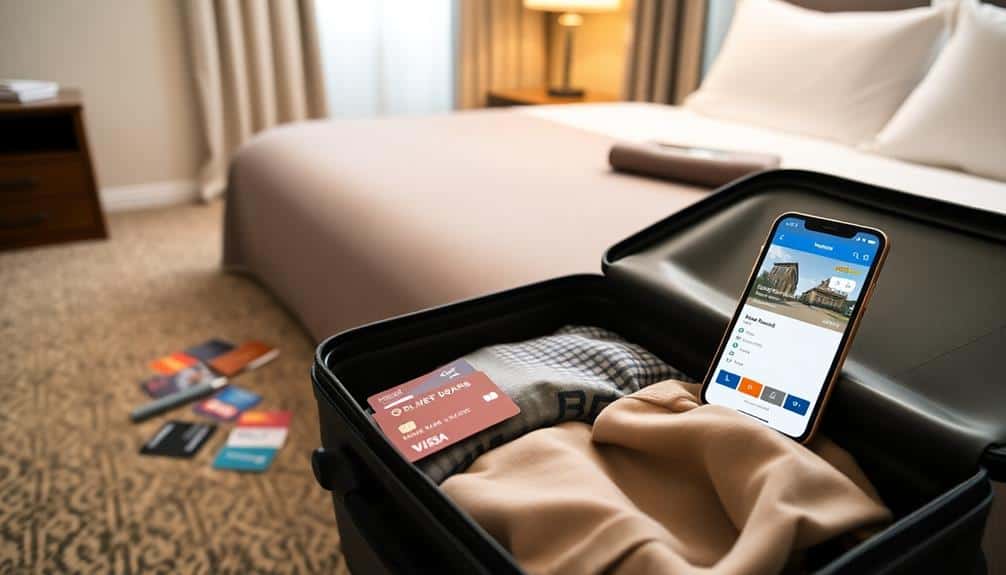
One of the best ways to save money on lodging is through loyalty programs. These programs, offered by major hotel chains and booking platforms, allow you to accumulate points or miles with each stay, which can be redeemed for free nights or room upgrades. To maximize your benefits, focus on a single program that aligns with your travel patterns and preferences. Many loyalty programs offer tiered status levels, providing additional perks like late check-out, complimentary breakfast, or access to exclusive lounges as you progress. Some credit cards also partner with hotel chains, allowing you to earn points on everyday purchases and transfer them to your preferred loyalty program. By strategically combining credit card rewards with hotel loyalty programs, you can drastically reduce your lodging expenses over time, especially for frequent travelers or those planning extended stays. Consider using packing cubes to organize your belongings efficiently, making it easier to unpack and settle into your accommodations quickly. Additionally, utilizing travel document holders can help you keep your loyalty program cards and other important documents secure and easily accessible during your trips.
Book Last-Minute Deals
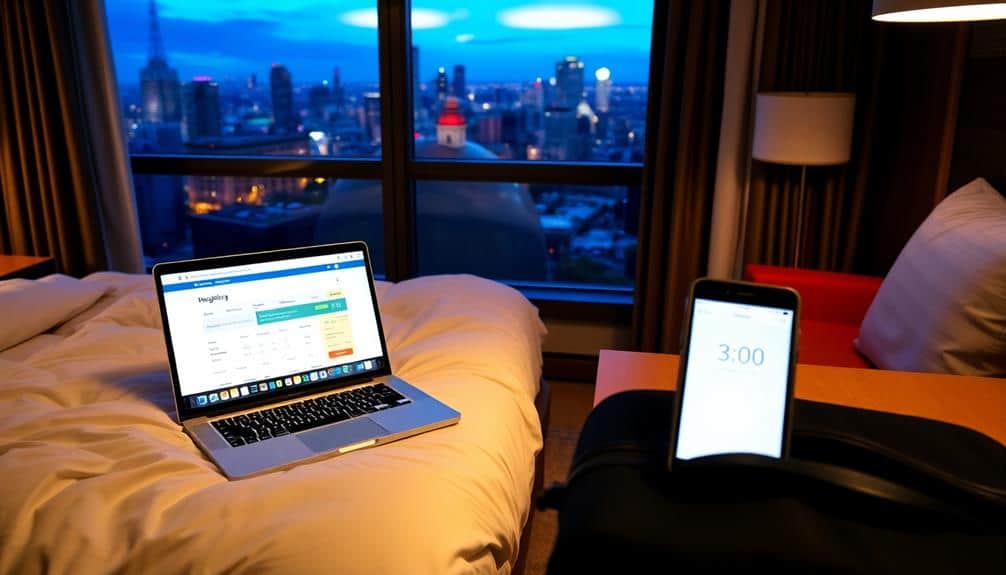
For those with flexible travel plans, booking last-minute deals can lead to significant savings on accommodations. Many hotels and vacation rental platforms offer steep discounts on unsold rooms as check-in dates approach. To capitalize on these opportunities, download apps like HotelTonight or Hopper, which specialize in last-minute bookings. These platforms often feature exclusive deals not available elsewhere. When searching for last-minute deals, consider using a portable Wi-Fi hotspot to guarantee reliable internet access for booking on the go, especially if you're traveling internationally.
Be prepared to act quickly when you spot a good offer, as last-minute deals can disappear rapidly. Consider expanding your search to include nearby areas or alternative property types to increase your options. Keep in mind that while you may save money, you'll have less choice in terms of specific properties or room types. It's also wise to have a backup plan in case you can't secure a suitable last-minute deal, especially during peak travel seasons or in popular destinations.
Explore Alternative Accommodation Options
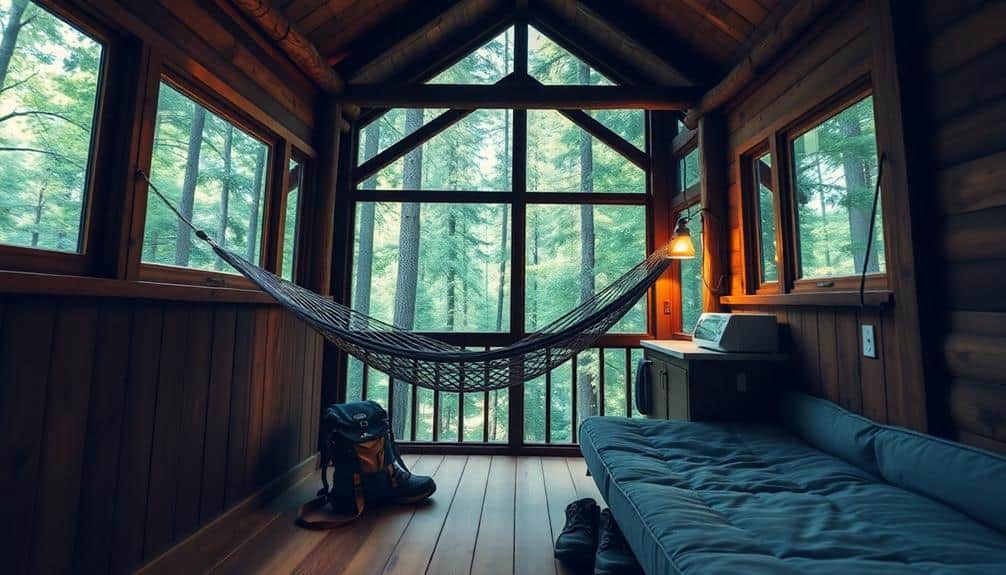
Savvy travelers can stretch their budgets by considering unconventional lodging options. Home-sharing platforms, like Airbnb and VRBO, offer unique accommodations, often at lower prices than traditional hotels. You'll find everything from private rooms to entire apartments or houses, providing a more local experience. Hostels, once associated primarily with backpackers, now cater to a wider audience with private rooms and improved amenities. For longer stays, consider house-sitting or home exchanges, which can provide free accommodation in exchange for pet care or simply swapping homes with another traveler. When planning your accommodation, don't forget to pack a reliable travel backpack to comfortably carry your essentials during your stay. Camping or glamping options, ranging from basic tent sites to luxury yurts, offer budget-friendly alternatives in scenic locations. University dormitories, available during summer breaks, can provide affordable lodging in prime city locations. By exploring these alternatives, you'll not only save money but also potentially enhance your travel experience with unique stays.
Negotiate Directly With Hotels
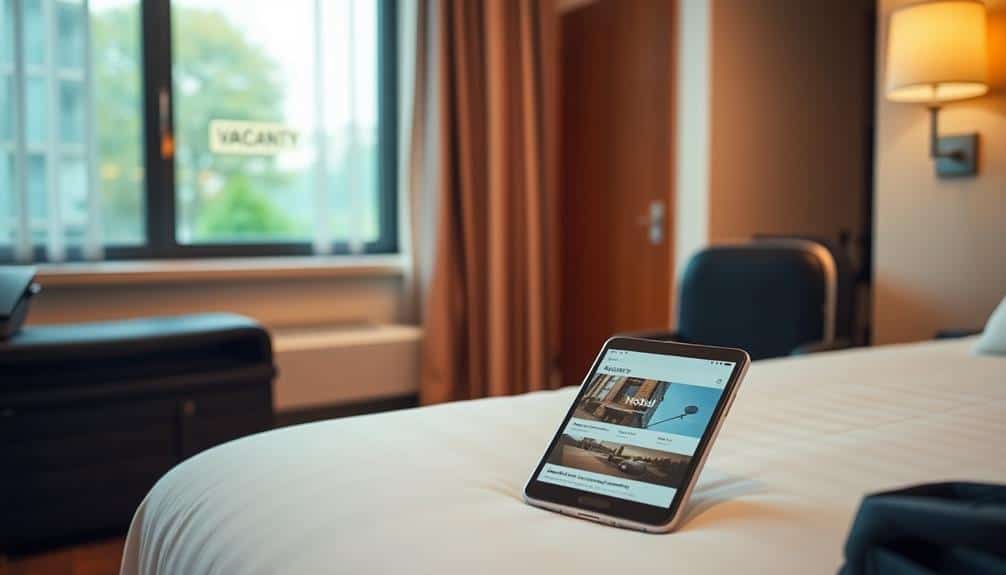
Booking through third-party websites isn't always the best way to secure a great hotel deal. Instead, try reaching out directly to the hotel's reservation desk. Many establishments are willing to negotiate rates, especially during off-peak seasons or if you're planning an extended stay. When contacting the hotel, inquire about any ongoing promotions, group discounts, or loyalty programs you might be eligible for. Be prepared to discuss your specific needs and budget constraints, as this information can help the hotel staff tailor an offer to your requirements. Don't hesitate to mention better rates you've found elsewhere, as hotels often prefer direct bookings and may match or beat competitor prices. Additionally, direct communication allows you to request room upgrades, complimentary services, or flexible check-in/check-out times, potentially enhancing your overall stay without increasing costs.
Use Price Comparison Websites
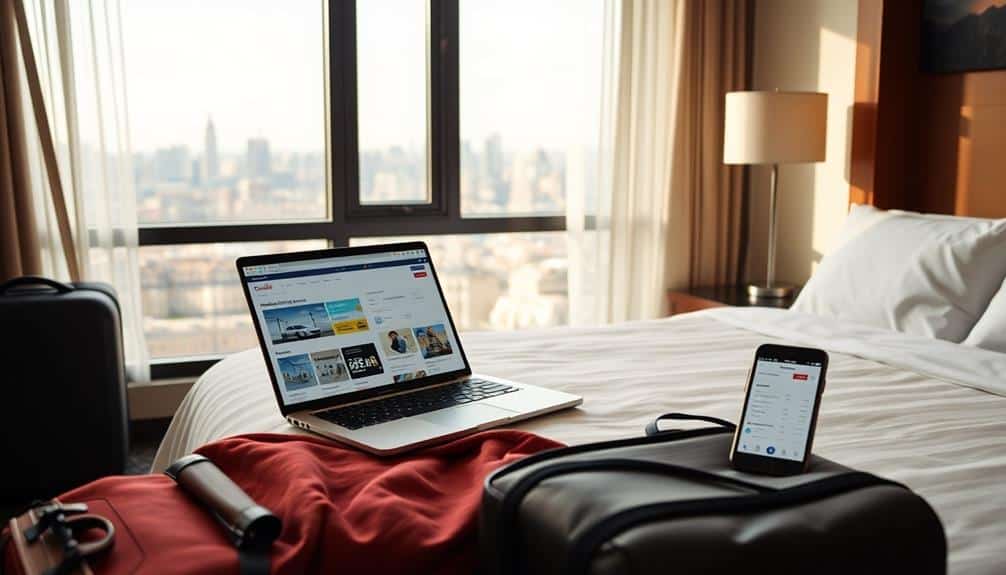
Efficiency is key when searching for the best hotel deals, and price comparison websites are invaluable tools for budget-conscious travelers. These platforms aggregate rates from multiple booking sites, allowing you to quickly compare prices across various hotels and dates. Popular options include Kayak, Trivago, and Google Hotels, each offering unique features to streamline your search process.
When using these sites, it's essential to adjust filters to match your specific requirements, such as amenities, star ratings, and location preferences. Many comparison websites also offer price prediction tools, which can help you determine the perfect time to book. Be aware that some sites may not include all available properties or rates, so it's advisable to cross-reference results with the hotel's official website. Additionally, consider signing up for price alerts to stay informed about fluctuations in rates for your desired accommodations.
Frequently Asked Questions
Is It Safe to Book Accommodations Through Peer-To-Peer Rental Platforms?
Booking accommodations through peer-to-peer rental platforms can be safe if you take proper precautions. Always read reviews carefully, communicate with hosts through the platform's messaging system, and verify their identity. Use secure payment methods provided by the platform, and never send money directly to hosts. Be aware of potential scams, such as fake listings or last-minute cancellations. Additionally, research the neighborhood's safety and consider purchasing travel insurance for added protection during your stay.
How Can I Avoid Hidden Fees When Booking Budget-Friendly Lodging?
You've just stumbled upon a vital aspect of budget travel. To avoid hidden fees when booking lodging, carefully read the fine print and terms of service. Look for additional charges like resort fees, cleaning fees, or taxes. Compare total costs, not just nightly rates. Use price comparison websites, but book directly with the property when possible. Ask about any potential extra charges before confirming your reservation. Consider all-inclusive options or properties that clearly state "no hidden fees" to minimize surprises.
What's the Best Time of Year to Find the Cheapest Hotel Rates?
You'll typically find the cheapest hotel rates during the off-season or shoulder season for your destination. This varies by location, but generally, it's when tourism is at its lowest. For many places, this means winter months (excluding holidays), or early spring and late fall. Midweek stays are often less expensive than weekends. To secure the best deals, you should book 4-6 weeks in advance, using price comparison tools and being flexible with your travel dates.
Are Hostels a Good Option for Families or Solo Female Travelers?
Hostels can be suitable for families and solo female travelers, depending on your preferences and the specific hostel. You'll find many hostels offer family rooms and female-only dorms, providing a more comfortable environment. Research thoroughly, reading reviews and checking safety features. Consider the hostel's location, amenities, and atmosphere. While they're often budget-friendly, you'll need to weigh the trade-offs in privacy and convenience. Some hostels cater specifically to families or women, offering tailored experiences and increased security measures.
How Do I Ensure My Accommodation Is Close to Public Transportation?
To guarantee your accommodation is close to public transportation, you'll want to research the area's transit system before booking. Use online mapping tools to identify major bus routes, subway stations, or train lines near potential lodgings. Many booking websites offer filters for proximity to public transport, which you can utilize. Additionally, read reviews from previous guests, as they often mention transportation accessibility. Don't hesitate to contact the property directly for specific information on nearby transit options and walking distances.
